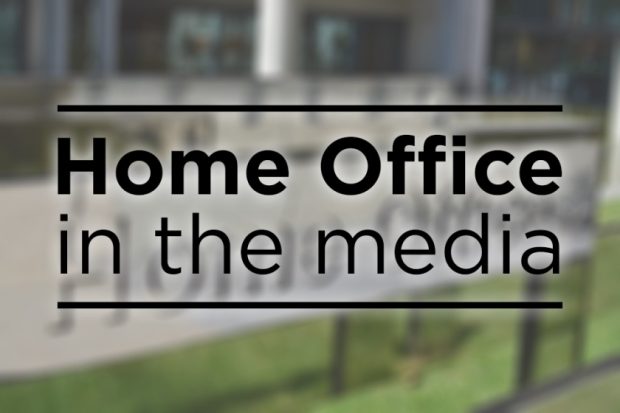This weekend's Home Office stories included a report on stop and search, further coverage looking at the Test of English for International Communication, and a report on Neo-Nazi groups.

Stop and search
On Saturday, The Telegraph, the Sun, the Independent, and the Guardian all reported on a briefing issued by the College of Policing on Friday about the enforcement of stop and search.
The Telegraph focus on the briefing’s suggestion that stop and search tactics may be increasing knife crime. This report said that whilst there was “consistent evidence” that stop and search helped reduce crime, it also said that “the benefit may be short-term”.
The College of Policing also found that if an individual felt they had been unfairly stopped by officers, it could increase the risk that they later considered violence or could undermine young people’s perception that the police are on their side.
The Guardian report that the study found that prison was significantly increasing reoffending compared to non-custodial sanctions, and first-time offenders made up the majority of those found guilty of knife or offensive weapons offences.
A Home Office spokesperson said:
Stop and search is a vital police tool when used in targeted and fair way.
As the College of Policing state, 80 per cent of arrests for possession of offensive weapons carried out by the Met Police followed a stop and search. Without this tactic these weapons would still be on our streets and more lives would be at risk.
The Home Secretary is committed to reducing serious violence and ensuring police have the right powers at their disposal.
Test of English for International Communication
The Guardian reported on Saturday that the National Audit Office (NAO) has launched a formal investigation on the Home Office decision that 34,000 international students cheated in their English language tests.
The paper says that this comes as more than 1,000 students have been removed from the UK as a result, and hundreds have spent time in detention. The Guardian suggest that large numbers of students say they were wrongly accused and that 300 cases are pending in court.
The NAO is expected to report on its findings in late May or June and is looking at information held by the Home Office.
A Home Office spokesperson said:
We have been supporting the National Audit Office in its work on this investigation since the start of the year. We will consider the findings of the report once it is published.
Neo-Nazi group defying legal ban
On Sunday, the Independent splashed on Neo-Nazi groups continuing to operate and recruit in the UK despite being a proscribed.
The paper notes National Action became the first far-right group to be proscribed as a terrorist organisation since the Second World War when the decision was taken by the Government in December 2016.
According to the Independent, court cases heard how the group had split into regional factions to dodge the ban and continue to operate and recruit. Two sub groups, Scottish Dawn and NS131, have since been proscribed.
The Independent understands that the police and Home Office are discussing whether to ban the terrorist group’s remaining factions, including the System Resistance Network, which was found to be recruiting members in Wales last year.
A Home Office spokesperson said:
Our counter-terrorism strategy, CONTEST, addresses all forms of terrorism and no individual or group is free to spread hate or incite violence.
We do not routinely comment on whether organisations are or are not under consideration for proscription.
